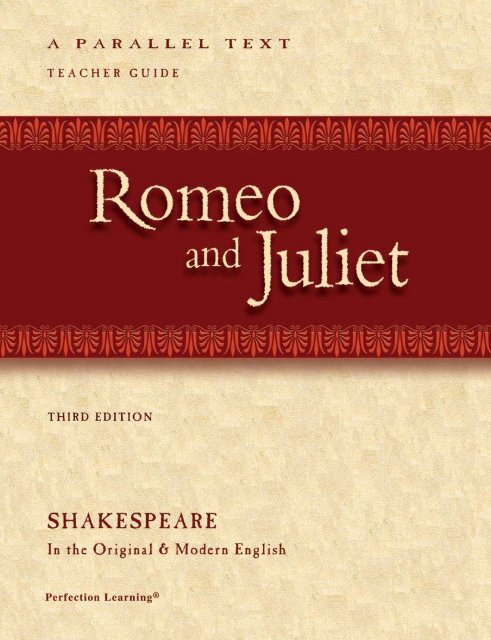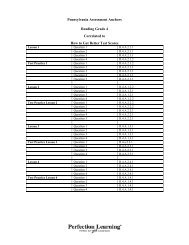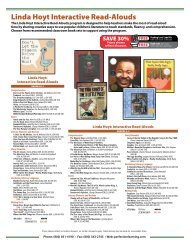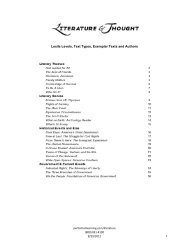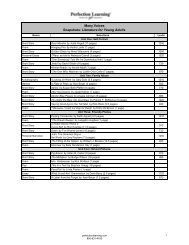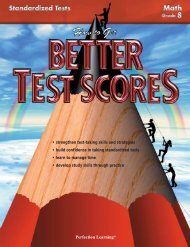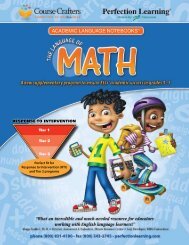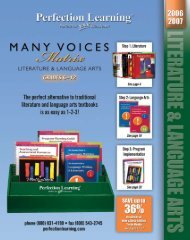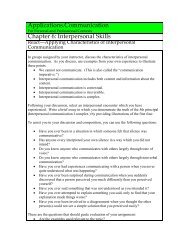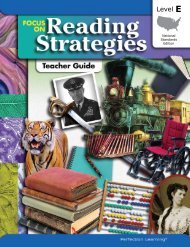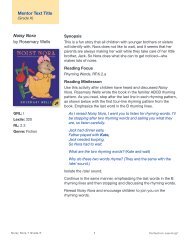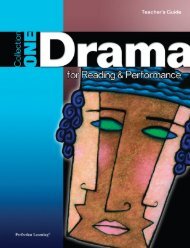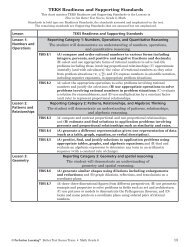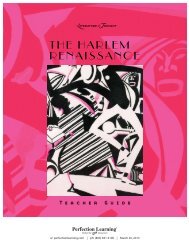Teacher Guide - Perfection Learning
Teacher Guide - Perfection Learning
Teacher Guide - Perfection Learning
Create successful ePaper yourself
Turn your PDF publications into a flip-book with our unique Google optimized e-Paper software.
TABLE OF CONTENTS<br />
ACT I . . . . . . . . . . . . . . . . . . . . . . . . . 3<br />
ACT I REVIEW . . . . . . . . . . . . . . . . . . . . . 4<br />
VOCABULARY QUIZ . . . . . . . . . . . . . . . . . . . 7<br />
ESSAY QUIZ . . . . . . . . . . . . . . . . . . . . . . 9<br />
ACT II . . . . . . . . . . . . . . . . . . . . . . . . 10<br />
ACT II REVIEW . . . . . . . . . . . . . . . . . . . . . 11<br />
VOCABULARY QUIZ . . . . . . . . . . . . . . . . . . . 14<br />
ESSAY QUIZ . . . . . . . . . . . . . . . . . . . . . . 16<br />
ACT III . . . . . . . . . . . . . . . . . . . . . . . . 17<br />
ACT III REVIEW . . . . . . . . . . . . . . . . . . . . 18<br />
VOCABULARY QUIZ . . . . . . . . . . . . . . . . . . . 21<br />
ESSAY QUIZ . . . . . . . . . . . . . . . . . . . . . . 23<br />
ACT IV . . . . . . . . . . . . . . . . . . . . . . . . 24<br />
ACT IV REVIEW . . . . . . . . . . . . . . . . . . . . . 25<br />
VOCABULARY QUIZ . . . . . . . . . . . . . . . . . . . 28<br />
ESSAY QUIZ . . . . . . . . . . . . . . . . . . . . . . 30<br />
ACT V . . . . . . . . . . . . . . . . . . . . . . . . . 31<br />
ACT V REVIEW . . . . . . . . . . . . . . . . . . . . . 32<br />
VOCABULARY QUIZ . . . . . . . . . . . . . . . . . . . 35<br />
ESSAY QUIZ . . . . . . . . . . . . . . . . . . . . . . 37<br />
THE PLAY IN REVIEW. . . . . . . . . . . . . . . . . . . 38<br />
END-OF-PLAY TEST. . . . . . . . . . . . . . . . . . . . 42<br />
VOCABULARY AND ESSAY QUIZZES ANSWER KEY . . . . . . 46<br />
END -OF-PLAY TEST ANSWER KEY . . . . . . . . . . . . . . 51<br />
2<br />
Table of Contents<br />
Romeo and Juliet
Act I<br />
“My only love sprung from my only hate!”<br />
Anticipation <strong>Guide</strong><br />
True or False<br />
_____ Some things are fated to happen, and we have<br />
no control over them. Whether students consider this<br />
statement true or false, have them support their opinions<br />
with specific examples from their experience.<br />
_____ Family feuds only harm the families involved.<br />
Consider whom else they might harm—friends or<br />
neighbors of each family? Business associates of either or<br />
both families? Innocent bystanders who happen to get in<br />
the way of violent conflict?<br />
_____ Love at first sight is possible. After students<br />
have registered their opinions, ask them for examples of<br />
“instant loves” that have lasted and stood the test of time.<br />
Encourage them to get beyond peers and celebrities and<br />
look at long-term partnerships or marriages in their<br />
parents’ or grandparents’ generations that started with<br />
“love at first sight” experiences.<br />
Before You Read<br />
1. The Prologue to Act I suggests that the<br />
relationship of Romeo and Juliet is doomed<br />
from the start. Some people believe that things<br />
are fated to happen, no matter what. Others<br />
believe that your actions can change the course<br />
of your life. Explain your own beliefs about fate.<br />
Answers will vary based on personal beliefs. The<br />
important element of any answer is the inclusion of<br />
supporting statements as to why students believe as<br />
they do. Be sure students can support their opinions<br />
with reasonable arguments.<br />
2. What role do you think a family should have in<br />
the selection of their child’s wife or husband?<br />
Ask students to consider their feelings about this<br />
question “here and now.” Then have them consider<br />
the different conditions existing in Europe in the<br />
Middle Ages, and how that might change their views.<br />
3. As you read, notice the opposites (love/hate;<br />
light/dark) that Shakespeare provides in his<br />
language and imagery. Think about what<br />
purpose opposites might have in this play. Point<br />
out that Shakespeare’s plays are known for their<br />
emotional intensity. Shakespeare rarely writes about<br />
calm, patient, rational people who make decisions<br />
and solve problems through reflection and<br />
deliberation. Suggest that students observe how the<br />
use of opposite helps establish the emotional tone of<br />
“good/bad,” “happy/sad” that motivates these<br />
characters.<br />
<strong>Teacher</strong> Suggestions<br />
• Have the class watch a movie version of the<br />
story before reading. The 1969 Romeo & Juliet,<br />
directed by Franco Zeffirelli, is a good choice.<br />
• Throughout the play, invite students to view paintings<br />
inspired by the story. You can identify and view many<br />
such paintings on the Emory “Shakespeare<br />
Illustrated” Web site, www.shakespeare.cc.emory.<br />
edu/<br />
• Before reading each Act, listen to a recording of it by<br />
professional actors. Such recordings are available in<br />
libraries and bookstores.<br />
• Locate Verona, Italy, on a map. Then find a map of<br />
historical Verona to get a feel for the size and layout<br />
of the town.<br />
• After reading the Prologue, ask students to speculate<br />
on what might have caused the feud between the two<br />
families. What specific events might have triggered<br />
such a sweeping, long-lasting enmity?<br />
• Many characters are introduced in Act I, and it is<br />
important to sort out “who’s who.” Assign students to<br />
keep a Play Journal throughout their study. As they<br />
begin Act I, they might set up a chart in three<br />
columns: “Capulet,” “Montague,” and “Neutral.” On<br />
their charts they can place each character in the<br />
proper column as he or she is introduced, noting any<br />
particular alliances or relationships as they emerge.<br />
Romeo and Juliet Act 1 3
Act Summary<br />
In the Prologue, a Chorus (or narrator) previews this<br />
play about two feuding families and the tragedy that<br />
occurs when their children meet and fall in love.<br />
One day, in the public square in Verona, Italy,<br />
two servants from the Capulet household pick a<br />
fight with rival servants from the Montague<br />
household. The Capulets and Montagues have<br />
quarreled for so many years that nobody even<br />
knows how their feud began.<br />
When the fight begins, a young Montague,<br />
Benvolio, tries to make peace. Instead, a fiery<br />
Capulet named Tybalt makes the tensions escalate.<br />
Soon, even onlookers and the elderly lords of the<br />
two warring sides are trying to join in the brawl.<br />
Prince Escalus, the ruler of Verona, arrives and<br />
demands that the fighting stop. In the quarrel’s<br />
aftermath, Lord Montague asks Benvolio, a friend of<br />
his son, Romeo, why Romeo seems so depressed.<br />
Benvolio tracks Romeo down and learns that he is<br />
in love with Rosaline, who doesn’t return his<br />
affections. Benvolio vows to make Romeo forget her.<br />
Meanwhile in the Capulet household, Lord<br />
Capulet and a nobleman named Paris discuss Paris’s<br />
proposal of marriage to Lord Capulet’s daughter<br />
Juliet. They discuss the masked banquet the<br />
Capulets will host that night and hope that Juliet<br />
will get to know Paris and agree to marry him. Of<br />
course, the hated Montagues are not invited to the<br />
banquet.<br />
When Benvolio and Romeo catch wind of it,<br />
though, they decide to go in disguise. During the<br />
party, Tybalt guesses their identity and vows revenge<br />
on Romeo, whom he assumes has come only to<br />
mock the Capulets and cause trouble.<br />
When Juliet catches Romeo’s eye at the banquet,<br />
he instantly forgets Rosaline. By the time Romeo<br />
and Juliet realize they are from warring families, it is<br />
too late: they have fallen in love.<br />
Act I Review<br />
Discussion Questions<br />
1. What does the first scene of the play reveal<br />
about Romeo’s behavior? Explain how he<br />
changes by the end of Act I. Romeo has been<br />
plunged into a state of lovesick melancholy. He is<br />
supposedly in love with the chaste Rosaline. But<br />
Shakespeare is careful to have him express his love in<br />
exaggerated, artificial language, including<br />
oxymorons, or contradictory terms. This signals right<br />
away that Rosaline is not Romeo’s true love; at this<br />
point, he is more in love with being in love than with<br />
any actual person. When he sees Juliet, however,<br />
Rosaline is forgotten. (“Did my heart love till now?<br />
Forswear it, sight! For I ne’er saw true beauty till<br />
this night.”) His feelings for Juliet ring truer. Instead<br />
of romantic anguish, Romeo expresses excitement.<br />
Instead of inventing tortured contradictions, he is<br />
wholehearted. Even when he learns she is the<br />
daughter of his enemy, he chooses to risk his safety<br />
and his family’s wrath to pursue her.<br />
2. What is your impression of Juliet’s father?<br />
Describe the relationship between Capulet and<br />
his daughter as it is shown during Scene ii.<br />
Capulet seems genial and fair-minded, and open to<br />
peace between the feuding families. At the ball he<br />
restrains Tybalt and insists that his hospitality<br />
extends even to Romeo, about whom he has heard<br />
good reports. Juliet is the Capulets’ only child; they<br />
have great hopes for her. Her father is indulgent,<br />
even allowing her some say in whom she marries. He<br />
is also protective. Although he married Juliet’s<br />
mother before she was 14, he gives Juliet’s youth as<br />
reason to delay marriage. And Capulet believes Juliet<br />
is a beauty. He encourages Paris to compare Juliet<br />
with other women who will be at his feast.<br />
3. What concepts of love are presented by the<br />
female characters in Scene iii? Lady Capulet<br />
praises Paris’s good looks to her daughter, suggesting<br />
that love dwells in the eye. It may dwell in the purse,<br />
too, for she pointedly mentions his wealth. Lady<br />
Capulet regards love as a practical matter and<br />
believes that Juliet has reached the proper age for it.<br />
By contrast, the Nurse regards love much as the<br />
Capulet servants do—with earthy gusto.<br />
4. Characterize Mercutio as he appears in Scene iv.<br />
What kind of friend is he to Romeo? Mercutio<br />
delights in words: his speech about the fairy-queen<br />
Mab is poetic and visionary. But when speaking of<br />
sex, Mercutio shares the bawdy viewpoint of the<br />
Nurse. Wanting to be a good friend, he tries to cheer<br />
Romeo “from the mire of love” using his gift of<br />
language. More disturbingly, Mercutio seems<br />
impulsive, even dangerously rash.<br />
4<br />
Act 1 Review<br />
Romeo and Juliet
5. What do you learn about Tybalt in Scene v?<br />
Tybalt hates the Montagues intensely and is willing<br />
to use violence. He assumes Romeo intends to insult<br />
the Capulets, and he wants revenge.<br />
6. Analyze the behavior of Tybalt, Mercutio, and<br />
Benvolio in Act I. Based on your analysis,<br />
predict what their roles might be in the rest of<br />
the play. Students might respond that Benvolio is a<br />
good friend who listens to and counsels Romeo. He<br />
seems to have Romeo’s best interests at heart and<br />
may be a calming influence if things get tense.<br />
Mercutio is also a good friend, using his quick wit to<br />
entertain and influence Romeo and his friends.<br />
However, his hot temper could cause trouble. Tybalt<br />
seems to have enormous hatred for the Montagues.<br />
Like Mercutio, he is prone to fighting. The two might<br />
provoke each other into violence.<br />
7. Compare Romeo’s reaction to Juliet’s when each<br />
discovers the true identity of the other. Both<br />
Romeo and Juliet are shaken by the discovery.<br />
Neither considers giving up their love, but they both<br />
struggle with the conflict between their love and<br />
their family’s hate.<br />
8. Do Romeo’s feelings for Juliet seem different<br />
from his feelings for Rosaline? Explain your<br />
answer. Answers should be supported. “Yes” answers<br />
may cite Romeo’s melancholy mood in the first scene<br />
versus his excitement in Scene v. Students might also<br />
note that Juliet reciprocates Romeo’s feelings, giving<br />
him reason to feel a more genuine bond with her<br />
than with Rosaline. “No” answers may see little<br />
difference between Romeo’s feelings for Rosaline and<br />
his instant switch to Juliet. He could just be in love<br />
with love.<br />
Literary Elements<br />
1. A foil is a character in literature who has<br />
qualities that are in sharp contrast to another<br />
character, thus emphasizing the qualities of<br />
each. How is Mercutio a foil to Romeo? Mercutio<br />
does not seem to worry. He is lively, fun loving,<br />
quick-tempered and mischievous. Romeo is moody<br />
and brooding.<br />
2. Foreshadowing refers to hints in the text about<br />
what will occur later. What examples of<br />
foreshadowing do you find in the Prologue and<br />
in Scene iv of Act I? Romeo tells his friends that he<br />
has had a dream that he will meet an “untimely<br />
death.”<br />
3. Hyperbole means obvious exaggeration. Look<br />
at Romeo’s declaration of love for Rosaline in<br />
Act I, Scene i. What examples can you find of<br />
hyperbole? Discuss why you think he overstates<br />
his feelings. Answers will vary. Examples include<br />
Romeo’s description of love as a sea filled with lovers’<br />
tears or his claim that forgetting Rosaline would be<br />
the same as forgetting to think. Romeo is caught up<br />
in the pleasure of romantic fantasy. He seems to<br />
enjoy torturing himself with the pain of frustrated<br />
love.<br />
4. A pun is a play on words that have similar<br />
sounds but more than one possible spelling or<br />
meaning. Scene iv, in which Romeo and his<br />
friends banter on the way to the Capulet’s<br />
masquerade party, is filled with puns. Find a<br />
pun in this scene, and explain its different<br />
meanings and effect. Answers will vary. Examples<br />
include the use of “torch,” referring both to a torch<br />
carried for light and to Romeo’s “carrying a torch”<br />
for Rosaline. “Visor” means both a mask for the<br />
party and the face that wears it. The effect is selfmockery—in<br />
the first case Romeo makes fun of<br />
himself, in the second Mercutio mocks his own<br />
appearance.<br />
5. Good drama has conflict: struggle between<br />
opposing forces. What conflicts are set in<br />
motion by events in Scene v? Among the conflicts<br />
are Tybalt’s resentment of Romeo’s presence at the<br />
party, Capulet’s reprimand of Tybalt’s angry threats,<br />
and the conflict between Romeo and Juliet’s feelings<br />
for each other and their loyalty to their families. The<br />
last might also be seen as the play’s defining conflict<br />
between love and hate, or fate and free will.<br />
Romeo and Juliet Act 1 Review 5
Writing Prompts<br />
1. Look up the rules for the 14-line form of verse<br />
known as a sonnet. Using the rhyme scheme of<br />
your choice, write a sonnet of romantic love. Or,<br />
you may want to write a sonnet that parodies or<br />
satirizes the form. You might suggest sources for<br />
information about the sonnet, like Merriam<br />
Webster’s Encyclopedia of Literature, and provide<br />
examples of sonnets. Find information and examples<br />
at these Web sites: Shakespeare’s Works, shakespeare.<br />
palomar.edu/works.htm or Bartleby.com Great Books<br />
Online, www.bartleby.com.<br />
2. Write a description of Romeo based on what<br />
you have learned about him so far. Use specific<br />
quotes from the play to support your writing.<br />
Suggest to students that before they write this<br />
description, they look through the text and make a<br />
list of everything that is said about Romeo by other<br />
characters, and a second list of everything Romeo<br />
says about himself.<br />
3. Assume that you write an advice column for a<br />
newspaper or magazine. A modern-day Romeo<br />
or Juliet writes to you asking for your advice. He<br />
or she explains what happened at the party and<br />
also mentions the family feud. First write his or<br />
her letter, and then write your response. You<br />
might want to provide students with examples of<br />
modern-day advice columns. You might also want<br />
them to write the letters as one assignment and then<br />
exchange the letters with each other to complete the<br />
response component of the assignment.<br />
4. Choose a scene and write a brief summary of its<br />
events in one sentence. You may choose to write<br />
it in standard English, contemporary slang or<br />
street talk, or the language of Shakespeare,<br />
Elizabethan English. Or write three summaries;<br />
use a separate style in each. You might prepare<br />
students for this activity by choosing a scene from a<br />
different play or even a scene from a television show<br />
or movie, and creating a summary sentence in all<br />
three styles. This could be provided as a handout or<br />
generated together as a class.<br />
5. Choose a quotation from any of the scenes in<br />
Act I that you feel best characterizes that scene.<br />
In a paragraph, discuss why you think this<br />
quotation is significant and effective at<br />
conveying the events or emotions of this scene.<br />
Students might organize their thoughts for this<br />
assignment by building on the preceding prompt.<br />
They might work with the scene they already<br />
summarized or select a different scene and start by<br />
summarizing the events or emotions of the scene in a<br />
concise sentence. Then they can look for an<br />
appropriate brief quotation and explain their choice.<br />
Words to Know<br />
adversary<br />
enemy; opponent<br />
augmenting adding to; enlarging<br />
deformities irregularities;<br />
disfigurements<br />
discreet<br />
showing good judgment;<br />
perceptive<br />
disparagement criticism; censure<br />
nuptial<br />
wedding; marriage<br />
obscured [obscur’d] hid; darkened<br />
pernicious harmful; destructive<br />
portentous ominous; threatening<br />
posterity<br />
future generations<br />
prodigious terrible; extraordinary<br />
profane<br />
dishonor; make impure<br />
propagate<br />
reproduce; increase<br />
purged [purg’d] got rid of; expelled<br />
Note: In Part II of the Vocabulary Quiz, sentences in<br />
quotation marks come from the original of<br />
Shakespeare’s play. Any sentences in<br />
contemporary English are meant to provide<br />
students with a clearer context for responding<br />
or to show the word’s modern usage.<br />
6<br />
Act 1 Review<br />
Romeo and Juliet
NAME<br />
DATE<br />
Vocabulary Quiz<br />
I. Match each vocabulary word in the first column to its closest synonym in the second column.<br />
nuptial<br />
pernicious<br />
disparagement<br />
propagate<br />
adversary<br />
augmenting<br />
prodigious<br />
portentous<br />
discreet<br />
deformities<br />
criticism<br />
terrible; extraordinary<br />
harmful<br />
wedding<br />
showing good judgment<br />
enlarging<br />
ominous; threatening<br />
opponent<br />
defects<br />
reproduce<br />
II. Circle the letter of the word that comes closest in meaning to the word in bold type.<br />
1. “Black and portentous must this humour prove.”<br />
a. humorous c. threatening<br />
b. deceitful d. annoying<br />
2. “Love is a smoke made with the fume of sighs; / Being purg’d [purged], a fire sparkling in<br />
lovers’ eyes.”<br />
a. righteous c. honest<br />
b. expelled d. hateful<br />
3. “For beauty starv’d with her severity / Cuts beauty off from all posterity.”<br />
a. heirs c. appreciation<br />
b. satisfaction d. health<br />
4. “A visor for a visor! What care I / What curious eye doth quote deformities?”<br />
a. cliches c. disfigurements<br />
b. obstacles d. disguises<br />
5. “Many a morning hath he there been seen, / With tears augmenting the fresh morning’s<br />
dew.”<br />
a. imitating c. gathering<br />
b. adding to d. replacing<br />
REPRODUCIBLE • ©2004 <strong>Perfection</strong> <strong>Learning</strong> Corporation Act I Vocabulary Quiz 7
NAME<br />
DATE<br />
6. “Prodigious birth of love it is to me / That I must love a loathed enemy.”<br />
a. hateful c. extraordinary<br />
b. long-awaited d. unexpected<br />
7. “Rebellious subjects, enemies to peace, / Profaners [profane] of this neighbor-stained steel—<br />
/ Will they not hear?”<br />
a. dishonorers c. supporters<br />
b. creators d. owners<br />
8. “That quench the fire of your pernicious rage / With purple fountains issuing from your<br />
veins.”<br />
a. enduring c. smoldering<br />
b. righteous d. destructive<br />
9. “Griefs of my own lie heavy in my breast, / Which thou wilt propagate to have it prest /<br />
With more of thine.”<br />
a. encourage c. remove<br />
b. increase d. heal<br />
10. “’Tis since the nuptial of Lucentio, / Come Pentecost as quickly as it will, / Some five and<br />
twenty years; and then we mask’d.”<br />
a. birth c. marriage<br />
b. funeral d. arrival<br />
11. “I would not for the wealth of all this town / Here in my house do him disparagement.”<br />
a. inequity c. credit<br />
b. disservice d. criticism<br />
12. “If I profane with my unworthiest hand / This holy shrine.”<br />
a. make impure c. adorn<br />
b. injure d. flatter<br />
13. “Here were the servants of your adversary, / And yours, close fighting ere I did approach.”<br />
a. kinsman c. household<br />
b. enemy d. hardship<br />
14. “What is it else? A madness most discreet, / A choking gall, and a preserving sweet.”<br />
a. disrespectful c. cruel<br />
b. perceptive d. deadly<br />
15. “And what obscur’d [obscured] in this fair volume lies / Find written in the margent of his<br />
eyes.”<br />
a. recorded c. stolen<br />
b. revealed d. hidden<br />
8<br />
Act I Vocabulary Quiz<br />
REPRODUCIBLE • ©2004 <strong>Perfection</strong> <strong>Learning</strong> Corporation
NAME<br />
DATE<br />
III. Create a sentence using at least three vocabulary words from Act I.<br />
________________________________________________________________________________________<br />
________________________________________________________________________________________<br />
________________________________________________________________________________________<br />
REPRODUCIBLE • ©2004 <strong>Perfection</strong> <strong>Learning</strong> Corporation Act 1 Essay Quiz 9


